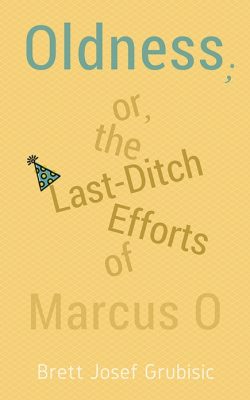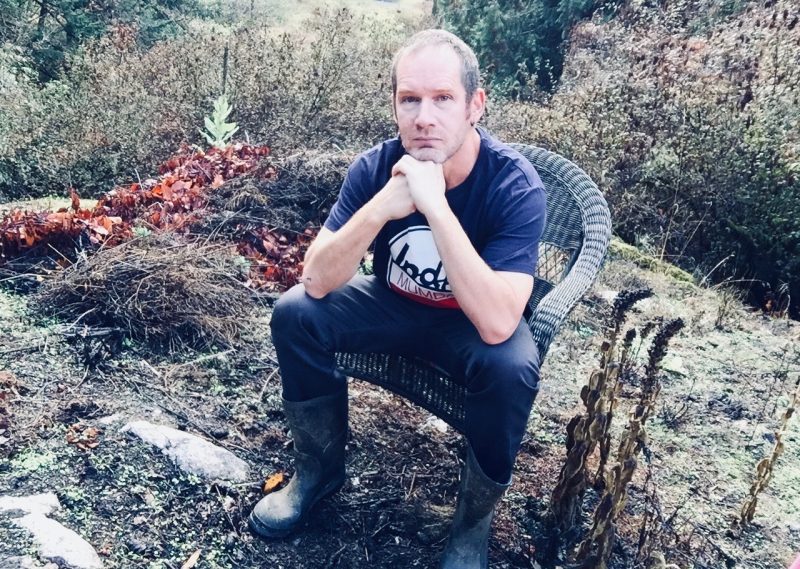#398 Boldness about oldness
October 13th, 2018

Oldness; or, the Last-Ditch Efforts of Marcus O
by Brett Josef Grubisic
Vancouver: Now or Never Publishing, 2018
$19.95 / 9781988098630
Reviewed by Dustin Cole
*
 I am 37. When I think about being 65, different things come to mind. There is hope for both artistic fulfillment and recognition. There are fears, too, of hearing loss, renal scans, colon removal. There is sombre resignation of the inevitable five-mile jog in the afternoon as debit against the six-pack to be had that evening. Woe to the elderly. Aging is a crisis. If you live that long.
I am 37. When I think about being 65, different things come to mind. There is hope for both artistic fulfillment and recognition. There are fears, too, of hearing loss, renal scans, colon removal. There is sombre resignation of the inevitable five-mile jog in the afternoon as debit against the six-pack to be had that evening. Woe to the elderly. Aging is a crisis. If you live that long.
Brett Josef Grubisic’s latest novel, Oldness; or, the Last-Ditch Efforts of Marcus O, explores the subject of oldness. In my hands it would have been tragedy, full stop. In his, it’s dour comedy. It is flippant and learned, exhaustively current, even cutting edge, yet still with a whiff of eczema salve. Add to that the wafting vapour of low-sodium cream of tomato soup, slightly scorched.
Now in his fifties, Grubisic — a professor of English at UBC — noticed an age spot on his hand which put him in mind of a specular threshold. Two demographics bordering each other but seemingly on different planets. One day, the vital apex of middle age; the next, poof, senior citizenry. He started thinking, what might it be like for me ten years after this discovery? The west coast in a window between 2023 and 2028, my sexagenarian self framed in it? “Mottled, a geezer, just like that.” Behold Marcus O.
In all his myriad facets, like the antic flickering of as many screens, we come to know Marcus as human — all too human. The verisimilitude is uncanny. Reading this novel, I was a rider in his head, traversing the lobes of his brain on down through the ventricles of his heart and along the tendrils of his soul. He is his own personal contrarian. His wry cynicism, beleaguered sarcasm, acid snideness, dismissive witticisms (galore), petty vengeance, prideful obstinance, involute paragraphs — paratactic, parenthetical, grotesque — all of it had me chortling page after page.
A memory of his academic unit’s facelift, the wood panelling and book spines replaced with “sleek technological spareness,” illustrates Marcus O’s dynamic temperament, at once lucid, drab, and despairing:
Years earlier, when incandescent bulbs had suddenly become as iffy a proposition as race-, religion-, gender-, size-, ethnicity-, disability-, or sexuality-based zingers at the office, he’d adjusted to the change automatically, even while disdaining the blue surgical light that represented an environmental good.
The air plant in the spherical mini-terrarium distributed to every office as regulation greenery, he’d accepted too.
Acceptance. He’d instantly pictured an Edwardian curmudgeon railing against light bulb filaments and mourning candlelight’s passing in rhyming couplets. No one hangs out with that guy, he understood. Out with the old, etc., etc.
Beneath the hilarity, profound sadness. “No one hangs out with that guy, he understood.” He understands because “that guy” is him. Along with the monographs in hardcopy, crass workplace humour, and tungsten, he is consigned to the waste bin. Because he’s out of touch? No, because he’s old.
While Grubisic’s subject is oldness, his theme is something we can all relate to: the mediation of thought by technology. Under this “surgical” light, the book is more contemporary hyper-realism than geriatric sci-fi. Marcus frequently consults Syb, a voice-activated piece of encyclopaedic hardware in the shape of a “tubby aluminum cylinder,” voice set to British (Female). It has trouble with diphthongs and triphthongs, but accesses the encyclopaedia’s annals on command, from the details of chimpanzee-human divergence to a brief history of calisthenics, prattling on until Marcus says stop.
He’s got a dermal monitor, too, or CMT, short for Compact Medical Technology:
Embedded in a translucent rectangular derma, the silvery labyrinth of sensor circuits kept track of organic and reliable but sporadically failure-prone bio-machinery. These circuits transmitted messages to analytic processors warehoused somewhere else.
In other words, it’s an implant that transmits his body function signals to a sentient cloud network. If he wants, he can pull out his tablet and watch real time statistics on the bus at a traffic light. He can “observe the release and catch of hormones, or the steady production of healthy cells.”
Marcus subscribes to the online dating site Venerati. He spends a fair chunk of his spare time pondering Venerati’s ACVQ, the AccuCoreValu Questionnaire™, “designed and perfected by a commissioned brain trust of leading field experts.” The questionnaire depicts a process of self-revision. These short interstitial chapters are the novel’s formal innovation:
ACVQ 9
How often in the last month have you felt misunderstood?
I’d expect to find a question of this sort on a psych eval given to military and police recruits.
Anything above an acceptably low number is an instant red flag meaning Should Not Have Access to Firearms.
I’ve been misunderstood several times. As for “felt misunderstood,” that belongs to the script of an adolescent, along with “it’s so unfair” and “No one even tries to get me,” and that hormonal sense of being a peg in a world overrun with round holes. After that, feeling misunderstood belongs to narcissists, the woefully immature, the clinically paranoid, and that population segment for whom life plateaued too soon and at too low a level; they’re resentful of that fact and need some external force on which to pin the blame.
In my field, being misunderstood is inevitable, an ordinary part of the job description. As for feeling misunderstood, that’s not at all common for me on any month.
Marcus quips, he deletes, he quips and deletes. He says something he means, but it’s too heavy for a dating site, so he forfeits his honest and distinctive opinions for something truthful, minus the affect and authenticity, and ends up sounding like a jellyfish with leather elbow patches. He censors his personality. Because he and Syb have done so much research on the topic of online dating, any attempt to represent himself with an earnest bit of text triggers second thoughts.
We learn so much about Marcus O in these struck passages, vulnerable, idiosyncratic things, sensible and wise things — but nobody he is trying to meet will ever see them.
This is, I think, the conflict of the book. He struggles to renew forms of unmediated thought and the actions which may follow. The notion of mediated thought can be extended beyond the novel’s wide spectrum of technologies and applied to other, often hypothetical people, as well as to institutions, even our most hallowed.
Indeed, the physical configuration and exterior surfaces of the university say as much about it as its course offerings and global rank:
Pluralistic utopian crystalline forms, exotic geometry that evoked promise of unfettered potential, fantastical elements of engineering whimsy along with the earthen and subterranean that promoted a perennial reverent organic oneness with the biosphere. A mindful city of mind at the edge of a coastal city of spired glass. What magnificence. Luminous with plenitude and potential, secular cathedrals where nearly every last mystery had been explained.
I imagined Marcus tootling over to the stacks with a cucumber on rye to brush up on Archigram theory and Friedensreich Hundertwasser while he waited for his next lecture, just so he could get the thought right. One wishes he would quit dicking around on internet dating platforms, bear down, and win the bloody MacArthur Fellowship already. But no, a foil bag of health snacks and a dusky stroll will be just fine, thanks.
At no time did I get the sense that this book, while cerebral as hell, was a compendium of mulish research. This is an achievement in itself. Often when reading contemporary research-heavy fiction, I can’t help seeing the highfalutin’ author knuckling down at the archive or haunting the rare books room.
Instead, Oldness is the vocational residue of an adulthood spent in academe, an entertaining portrait of a hapless brainiac rendered with stylish derring-do. Given the sacrifice and the masochistic labour of the ivory tower, Grubisic’s time there was well-spent. If we take into account his new book, he has found some truth there, never truer than now.
*
Dustin Cole was born in Hinton, near Jasper, and raised in the town of High Level, a remote community in northwestern Alberta. He received his B.A. in history from Simon Fraser University and lived in Vancouver until 2018. He is author of Dream Peripheries (Vancouver: General Delivery, 2015), a collection of oneiric poetry. Dustin now lives in Slave Lake, Alberta.
*
The Ormsby Review. More Books. More Reviews. More Often.
Editor/Designer/Writer: Richard Mackie
Publisher/Writer: Alan Twigg
The Ormsby Review is a journal service for serious coverage of B.C. books and authors, hosted by Simon Fraser University. The Advisory Board consists of Jean Barman, Robin Fisher, Cole Harris, Wade Davis, Hugh Johnston, Patricia Roy, David Stouck, and Graeme Wynn. Scholarly Patron: SFU Graduate Liberal Studies. Honorary Patron: Yosef Wosk. As of September, 2018, Provincial Government Patron: Creative BC
“Only connect.” – E.M. Forster




Leave a Reply